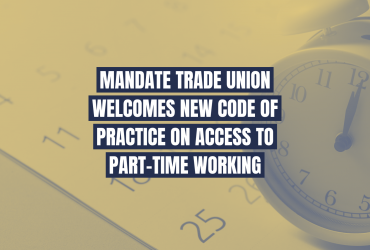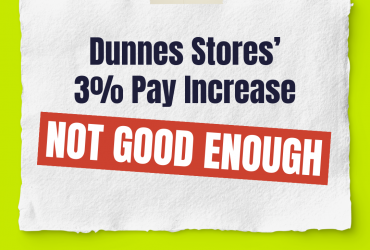ICTU BDC Presidential Speech by John Douglas
Tuesday 7 July 2015Brothers and Sisters,
As we gather here today in Ennis, Co Clare, as the largest civil society organisation on the island of Ireland, we do so at a time of great uncertainty – uncertainty about an economic and social recovery not only in Ireland but also across Europe, and particularly our thoughts and solidarity are with the people of Greece, who are being put through the ringer by their creditors – the potential long term damage to the social fabric of Greece is immense and as in Ireland will penalise the most vulnerable, while the elite are allowed to continued their lifestyle unhindered. The Governments of Europe, including the Irish sit idly by with a smugness which to say the least is inappropriate, if not downright offensive.
There needs to be a European Debt Conference at which the issue of debt and debt restructuring is considered from the social perspective of the peoples of Europe, rather than solely from the financial institutions of Europe and the ideologues of austerity.
As trade unionists and internationalists we take no satisfaction from the distress of others either at home or abroad – our watchword is solidarity with the workers, families of Greece, Spain, Portugal etc., let us as an international trade union movement stand together for justice.
In the very near future our solidarity as an international trade union movement and as an effective campaigning movement will again be called into action …
The so called Brit Exit Referendum in the UK must not be allowed to give the UK Tory Government an opportunity to attack social Europe, human rights and workers’ rights – the rest of Europe must stand firm in defending decency in the UK – failure to do calls into question the very rational for the existence of a European Union, if the Tory Government succeeds the European Union will become no more than a patch-work of opt outs in which countries try and gain advantage over the neighbours. We must also continue to vigorously campaign against one sided international free trade agreements such as TTIP – are a charter for a race to the lowest common denominator in which labour standards and trade union rights are seen as blockages to “so called free trade” and where international financers and global corporations can sue Sovereign states in secret corporate courts as part of the ISDS process. These secret courts and free trade agreements have little to do with free trade but all to do with protecting international capital and weakening labour.
Turning back to Ireland, there appears some tenacious signs of a recovery in the Irish economy, at least in the Republic of Ireland, I will turn to the Northern Ireland later.
The trade union movement must be vigilant that those forces that wreaked havoc on our economy and our society are not allowed to rebuild their same failed economic model again. We must ensure that the most vulnerable are prioritised in any recovery and that the unfair damage inflicted on the social wage is repaired, that resources are prioritised to lift families out of poverty and homelessness, that decent living wage jobs are created and that all sectors of our economy make a fair and equitable contribution towards resourcing the recovery of our society.
We cannot allow political parties to play loose and easy with our vision of a real fair sustainable social recovery by auction politics to secure votes. We must expose these politicians and self interest groups that would trade decency and a social wage for power and gain.
A mature conversation is required among all the citizens of Ireland as we approach the centenary of 1916 as to what sort of economy and society we want and what are we prepared to pay for that vision.
Self-interest must be set aside, the “I’m alright Jack” attitude of appeasing sections of voters or union members must be set aside … We must all “join the dots” between decent public services in health, education, housing etc and our social contributions as citizens of this island. Our public services on receiving theses resources must continue to deliver a world class service to those who resource the social wage and must be willing and able to adapt to the changing needs of citizens and society.
The broken social wage system we have at the moment forces tens of thousands of citizens to take out private provision in a market driven solely by the profit motive and that market only exists because of the inadequate manner in which we fund and deliver public services, this suits the ideology of many political parties hence they have a vested interest in starving public services of resources.
The Trade Union movement is a resilient movement, we have withstood, as did our comrades across Europe, an orchestrated campaign to destroy and marginalise us… On this island of Ireland the Trade Union movement is stronger than ever … we have rediscovered our activism and campaigning spirit, we have shaken off the shackles of top down centralised bargaining … our members are mobilising and winning, they have rediscovered collectivism and collective action where necessary. Our unions have retrained, refocused and redeployed tens of thousands of new union activists … We are stronger now and more capable of defending and winning for our members. We are cutting the teeth of a whole new generation of trade union leaders and community activists in struggles such as Greyhound, Paris Bakery, Rathigan, Dublin Bus, Connolly Shoes, Clerys, Vita Cortex, and Dunnes Stores. We are again working with and in local communities, forming alliances and as a result we have won the public narrative, in fact we have changed the public narrative.
Nothing proves this more than the Decency for Dunnes Stores Workers campaign … the public get it, a decent job and a decent living wage are basic human rights. The Irish public are now disposed to trade unions now more than ever in the recent past because we are fighting for and standing up for real everyday issues which impact their families, communities, their work places. The public’s experience of previous corrupt regimes has been exposed, the public has outed the cheer leaders of big capital, they understand that a strong social movement such as the trade union movement is essential for a fairer society, for without one the financial wolves would have another field day.
The demonization of unions and workers had failed, collectively our members and their communities have a central role in rebuilding this country form the ground up. We are not interested in a social dialogue which confines and constrains the legitimate role of all our members.
In what was the biggest mass social mobilisation since the founding of the State, the Right2Water and Anti Water Charges movement can give us an indication of just what can be achieved by people power, by communities, union members and some trade unions working together towards a single objective. While the water charge movement did and does not have universal support within the trade union movement, it is true to say that the extensive concessions won by the campaign will be enjoyed by all trade unionists. And while it is understood and understandable that some unions because of their particular membership base or indeed constitutions cannot openly support the campaign, it is clear that union members across all unions are a central part of the Anti-Water Charges movement. I believe that if the trade union movement was totally absent from the Anti-Water Charges movement that it would have severely damaged the credibility of this movement. There are two motions on water charges on the agenda for decision this week and I am confident that as trade unionists we can have a respectful and reasoned debate in the knowledge that there are no enemies in this hall today, just comrades with different views and tactics – all striving for the same goal.
It is two years since the Belfast Conference at which we set ourselves some very important objectives, some of these objectives we have achieved, others we continue to struggle for – a work in progress.
For example we have managed to win legislation on collective bargaining, although far from perfect it can form a foundation on which to win and build on further. But delegates, legislation on collective bargaining alone will not do the heavy lifting for the trade union movement. We must recruit an organise, educate and agitate, every union must work as part of a movement, we owe our very existence to the unselfish sacrifices of previous generations of trade unionists, Dockers, builders, retail workers, public servants all of whom who put the self-interests of their own grade aside for a greater ideal. No legislation will ever do this for us, so whether it is Fair Hotel or Fair Shop campaigns we must stand together in supporting each other and supporting goods and services that are deliver and manufactured in employments which respect their workers and their workers’ rights, the others are not deserving of our support .
We also won the re-establishment of the Joint Labour Committees and the Registered Employment Agreement after they were struck down by the High Court on application by various employer groups. The Joint Labour Committees and the Registered Employment Agreements have the potential to set basic decency thresholds and standards in sectors of the economy where abuse and exploitation are rife, such as hospitality, retail, cleaning, security and construction. But we are concerned with the attitude of employers in these sectors, already we have seen employers in the retail sector refuse to engage in the newly established JLC thereby vetoing the expressed wishes of Government. I am calling on the Irish Government to introduce immediate legislation to either compel employers in these sectors to engage or legislation which makes it possible to proceed without them.
I am also disappointed that during my term as President we have as yet not succeeded in removing FEMPI from the Statute Book – this legislation is an affront to good industrial relations and has no place in free collective bargaining. But I also acknowledge the first step at pay restoration in the public service under the Lansdown Road Agreement, but I will refrain from further comment as I am aware that a number of unions are still consulting their members on same, suffice to say that our objective is full restoration and the removal of FEMPI.
The other objective remaining as work in progress is the Trade Union Commission. While progress has been painfully slow, there are a considerable number of unions working behind the scenes co-operating and sharing resources and projects. The work of the Commission is as much a state of mind as a brick and mortar project.
The Commission has allowed the conversation to happen, with unions opening up to each other, to supporting our shared objectives – none so much as the Decency for Dunnes Campaign. The level of support, shared resources, staff etc., was overwhelming there was no divide between public/private, higher/lower paid, or North and South.
The Commission’s work by its very nature is ongoing and it will bear fruit, we are changing, and we are changing to win.
Turing now briefly to Northern Ireland, and I know bother Bunting will cover Northern Ireland more extensively during the week.
I would like to commend the NIC ICTU for its ongoing campaign against the Tory Government’s austerity agenda and attacks on welfare. This campaign brought tens of thousands of trade unionists and their families onto the streets across Northern Ireland on the 13 March 2015.
Northern Ireland is already the most deprived region in the UK and the welfare cuts and the 20,000 public sector jobs loses being enforced by the Tory Government will if unchallenged plunge Northern Ireland into the dark ages.
The present budgetary impasse in Northern Ireland is a reflection of the seriousness of the situation, the trade union movement in Northern Ireland has lead the way in opposition to the cuts and arguably has forced some political parties to shift and support our stance.
While the Good Friday Agreement was essentially a political settlement between the parties which delivered the peace, it must also deliver on its commitments to the citizens of Northern Ireland for decent jobs, social services and a bill of rights, not to do so jeopardies the peace which all on this island hold so dear.
The British and Irish Governments need to recognise Northern Ireland as a region emerging from conflict, a region with special and unique requirements, austerity policies are damaging to all communities in Ireland and the UK, but they are doubly damaging in an already fragile and poverty stricken region which is Northern Ireland.
This is the reality, the Irish and British Governments need to grasp, and the reality that all parties in Northern Ireland who have the real best interests of their communities at heart must accept. A united cross community opposition platform to Tory austerity cuts is the best and only way or protecting all communities against poverty and discrimination in Northern Ireland.
As we head into the centenary of 1916 and the first reading on the streets of Dublin of the Proclamation of a Republic which has at its core the socialist principles of equality, liberty and fraternity we must critically examine the Ireland of today in terms of these founding ideals, we must ask ourselves as one of the wealthiest nations in Europe, why are we also one of the most unequal? Do we still as a nation aspire to these core principles?
And, if the answer is yes, then we need to know how falls the statistics on child poverty, on homelessness, on social housing, on income inequality, the attacks on single parents and under 26 year of age welfare payments, our treatment of migrant workers and asylum seekers in direct provision – all of these devalue our status as a Republic and are an indictment on this and previous governments.
2016 also leads us into a possible election year during which we as trade unionists must grasp the nettle of political power with our membership bases. We must campaign for a government which advocates and implements the true ideals of a Republic, we must campaign for a mass mobilisation akin to what we witnessed during the marriage equality referendum in order to secure the political ground which allows us to deliver the social agenda along with the industrial agenda.
- We must challenge our members
- We must question party loyalties
- We must set aside our own self-interest or the self-interests of our members
Our vision can never be achieved by industrial agitation alone!
No union can profess to be non-political!
Each morning your members wait for a bus, or wait in A&E is a result of a political decision, in fact some unions who claim to be generally non-political are often the most political when it comes to protecting and advancing their own members’ interests.
We must engage with our 750,000 members and their families so that they appreciate the great potential for change as yet unharnessed within the trade union movement we must not abandon the future wellbeing of our members, their families and future generations. We must show real leadership, real vision, most of all our members must believe that they and they alone acting together can achieve this vision.
In the words of James Connolly….
“For our demands most moderate are …
we only want the earth.”






